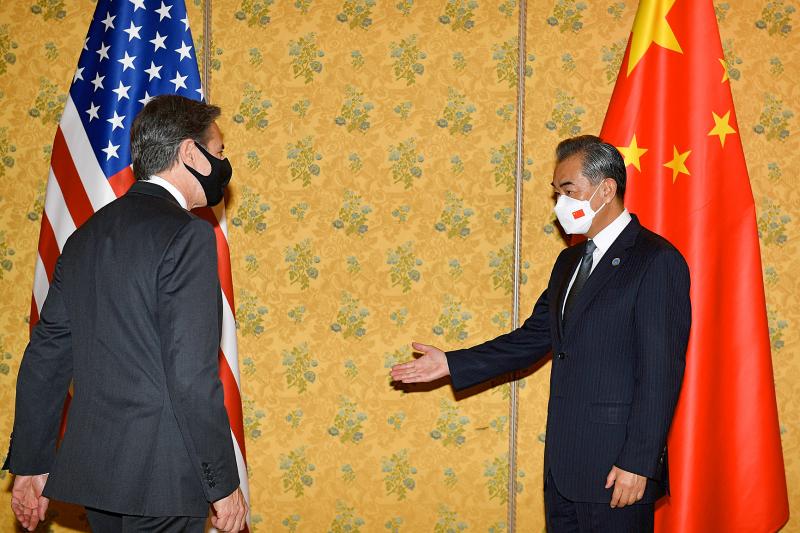US Secretary of State Antony Blinken yesterday told his Chinese counterpart that the US opposes actions by China that have increased tensions across the Taiwan Strait, a senior US Department of State official said.
During the hour-long meeting with Chinese Minister of Foreign Affairs Wang Yi (王毅) on the sidelines of a G20 summit in Rome, Blinken made “crystal clear” that Washington opposes any unilateral changes by Beijing to the “status quo” there, the official said.
An increase in Chinese military exercises in Taiwan’s air defence identification zone in the past few months are part of what Taiwan views as stepped-up military harassment by Beijing.

Photo: AP
The US wants to manage the intense competition between the world’s two largest economies responsibly, the state department official said, adding that both sides acknowledged that open lines of communication are paramount.
While the US, like most countries, has no formal ties with Taiwan, Washington is the nation’s most important international backer and main arms supplier, and is required by law to provide it with the means to defend itself.
Washington has long followed a policy of “strategic ambiguity” on whether it would intervene militarily to protect Taiwan in the event of a Chinese attack, although US President Joe Biden last week said that the US would come to Taiwan’s defense if necessary.
Blinken made clear that Washington had not changed its “one China” policy regarding Taiwan, the official said.
He and Wang did not discuss a recent Chinese hypersonic weapons test that military experts say appears to show Beijing’s pursuit of an Earth-orbiting system designed to evade US missile defenses, the official said.
Separately, Chinese President Xi Jinping (習近平) on Saturday called for mutual recognition of COVID-19 vaccines based on the WHO’s emergency use list, according to a transcript of his remarks published by China’s Xinhua news agency.
Speaking to the G20 Leaders’ Summit via video link, Xi said that China had provided more than 1.6 billion COVID-19 shots to the world, and was working with 16 nations to cooperate on manufacturing doses.
“China is willing to work with all parties to improve the accessibility and affordability of COVID-19 vaccines in developing countries,” Xi said.
Xi reiterated China’s support of the WTO making an early decision on waiving intellectual property rights for COVID-19 vaccines, and he called for vaccine companies to be encouraged to transfer technology to developing countries.
Two Chinese vaccines have been included in the WHO’s emergency use list.
Xi also called for policies to maintain global economic and financial stability, saying that China would strengthen macroeconomic policy coordination and maintain policy continuity, stability and sustainability.
“Major economies should adopt responsible macroeconomic policies to avoid negative spillover effects to developing countries and maintain the steady operation of the international economic and financial system,” he said.
Xi’s statement came as G20 leaders endorsed a global minimum tax on corporations, a linchpin of new international tax rules aimed at blunting the edge of tax havens amid skyrocketing profits of some multinational businesses.
The move was hailed by US Secretary of the Treasury Janet Yellen as benefiting US businesses and workers.
G20 finance ministers in July agreed on a 15 percent minimum tax, which the leaders’ summit formally endorsed.
Additional reporting by AP

‘FORM OF PROTEST’: The German Institute Taipei said it was ‘shocked’ to see Nazi symbolism used in connection with political aims as it condemned the incident Sung Chien-liang (宋建樑), who led efforts to recall Democratic Progressive Party (DPP) Legislator Lee Kun-cheng (李坤城), was released on bail of NT$80,000 yesterday amid an outcry over a Nazi armband he wore to questioning the night before. Sung arrived at the New Taipei City District Prosecutors’ Office for questioning in a recall petition forgery case on Tuesday night wearing a red armband bearing a swastika, carrying a copy of Adolf Hitler’s Mein Kampf and giving a Nazi salute. Sung left the building at 1:15am without the armband and apparently covering the book with a coat. This is a serious international scandal and Chinese

PERSONAL DATA: The implicated KMT members allegedly compiled their petitions by copying names from party lists without the consent of the people concerned Judicial authorities searched six locations yesterday and questioned six people, including one elderly Chinese Nationalist Party (KMT) member and five KMT Youth League associates, about alleged signature forgery and fraud relating to their recall efforts against two Democratic Progressive Party (DPP) legislators. After launching a probe into alleged signature forgery and related fraud in the KMT’s recall effort, prosecutors received a number of complaints, including about one petition that had 1,748 signatures of voters whose family members said they had already passed away, and also voters who said they did not approve the use of their name, Taipei Deputy Chief Prosecutor

UNDER ATTACK: Raymond Greene said there were 412 billion malicious threats in the Asia-Pacific region in the first half of 2023, with 55 percent targeting Taiwan Taiwan not only faces military intimidation from China, but is also on the front line of global cybersecurity threats, and it is taking action to counter those attacks, President William Lai (賴清德) said yesterday. Speaking at the opening of this year’s Cybersec Expo in Taipei, the president assured foreign diplomats and exhibitors that Taiwan remained committed to strengthening its defense against cyberattacks and enhancing the resilience of its digital infrastructure. Lai referenced a report from the National Security Bureau (NSB) indicating that the Government Service Network faced an average of 2.4 million intrusion attempts daily last year, more than double the figure

Retired US general Robert B. Abrams reportedly served as adviser to Chief of the General Staff Admiral Mei Chia-shu (梅家樹) during the Ministry of National Defense’s computer-simulated war games in the buildup to this year’s 41st annual Han Kuang military exercises, local media reported yesterday. For 14 days and 13 nights starting on April 5 and ending yesterday, the armed forces conducted the computer-simulated war games component of the Han Kuang exercises, utilizing the joint theater-level simulation system (JTLS). Using the JTLS, the exercise simulated a continuous 24-hour confrontation based on scenarios such as “gray zone” incursions and the Chinese People’s Liberation